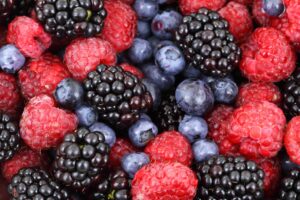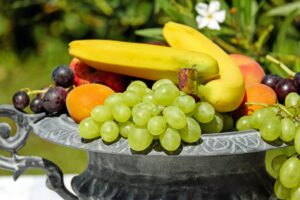
Stroke is a serious health condition that occurs when the blood supply to the brain is interrupted or reduced, depriving the brain of oxygen and nutrients. It is one of the leading causes of death and disability worldwide. However, many strokes can be prevented through a healthy lifestyle, including a balanced diet. A balanced diet can help reduce the risk of stroke by improving overall health and reducing risk factors such as high blood pressure, high cholesterol, and obesity.
A balanced diet is one that provides all the necessary nutrients in the right proportions to support good health. It includes a variety of foods from different food groups, such as fruits, vegetables, whole grains, lean proteins, and healthy fats. By consuming a balanced diet, you can ensure that your body receives the essential nutrients it needs to function properly and maintain good health.
Key Takeaways
- A balanced diet is crucial for stroke prevention.
- Nutrient-dense foods provide essential vitamins and minerals for overall health.
- Eating whole, unprocessed foods has numerous benefits for stroke prevention.
- Fruits and vegetables are powerful tools in preventing strokes.
- Heart-healthy eating habits are closely linked to stroke prevention.
Nutrient-Dense Foods: What They Are and Why They Matter

Nutrient-dense foods are those that provide a high amount of nutrients relative to their calorie content. These foods are important for stroke prevention because they provide the body with the nutrients it needs to function properly and maintain good health. Examples of nutrient-dense foods include fruits, vegetables, whole grains, lean proteins, and healthy fats.
Fruits and vegetables are particularly important for stroke prevention as they are rich in vitamins, minerals, and antioxidants. These nutrients help protect against oxidative stress and inflammation, which are risk factors for stroke. Whole grains are also important as they provide fiber, which helps maintain healthy cholesterol levels and reduce inflammation. Lean proteins, such as fish and poultry, provide essential amino acids that support brain health.
Whole Foods: The Benefits of Eating Unprocessed Foods
Whole foods are those that are minimally processed and contain no added sugars or artificial ingredients. They include fruits, vegetables, whole grains, lean proteins, and healthy fats. Eating whole foods can help reduce the risk of stroke by providing the body with essential nutrients and reducing the intake of harmful additives.
Processed foods, on the other hand, are often high in added sugars, unhealthy fats, and sodium. These ingredients can increase the risk of stroke by contributing to high blood pressure, high cholesterol, and obesity. By choosing whole foods over processed foods, you can ensure that you are consuming a diet that is rich in nutrients and low in harmful additives.
Fruits and Vegetables: The Powerhouses of Stroke Prevention
Fruits and vegetables are powerhouses when it comes to stroke prevention. They are rich in vitamins, minerals, and antioxidants that can help reduce the risk of stroke. Antioxidants are compounds that help protect the body against damage from free radicals, which are unstable molecules that can cause oxidative stress and inflammation.
Eating a variety of fruits and vegetables can also help maintain a healthy weight, which is important for stroke prevention. Obesity is a risk factor for stroke as it can contribute to high blood pressure, high cholesterol, and diabetes. By incorporating a variety of fruits and vegetables into your diet, you can help reduce the risk of stroke and improve overall health.
Heart-Healthy Eating: The Connection Between Heart Health and Stroke Prevention
Heart-healthy eating is important for stroke prevention because many of the risk factors for heart disease are also risk factors for stroke. These risk factors include high blood pressure, high cholesterol, obesity, diabetes, and smoking. By eating a diet that is low in saturated and trans fats, cholesterol, and sodium, you can help reduce the risk of both heart disease and stroke.
A heart-healthy diet includes plenty of fruits and vegetables, whole grains, lean proteins, and healthy fats. It also limits the intake of processed foods, sugary beverages, and foods high in sodium. By following a heart-healthy diet, you can help maintain healthy blood pressure and cholesterol levels, reduce inflammation, and improve overall cardiovascular health.
Omega-3 Fatty Acids: The Role They Play in Stroke Prevention

Omega-3 fatty acids are a type of healthy fat that can help reduce inflammation and improve heart health. They are found in fatty fish, such as salmon, mackerel, and sardines, as well as in flaxseeds, chia seeds, and walnuts. Eating foods that are rich in omega-3s can help reduce the risk of stroke.
Omega-3 fatty acids have been shown to reduce blood pressure, improve blood vessel function, and decrease the risk of blood clots. They also have anti-inflammatory properties, which can help protect against oxidative stress and inflammation, both of which are risk factors for stroke. By incorporating omega-3-rich foods into your diet, you can help reduce the risk of stroke and improve overall cardiovascular health.
Antioxidants: How They Protect Against Stroke
Antioxidants are compounds that help protect the body against damage from free radicals. Free radicals are unstable molecules that can cause oxidative stress and inflammation, which are risk factors for stroke. Eating foods that are rich in antioxidants can help reduce the risk of stroke by protecting against oxidative stress.
Fruits and vegetables are particularly rich in antioxidants, such as vitamins C and E, beta-carotene, and flavonoids. Berries, leafy greens, citrus fruits, and cruciferous vegetables are especially high in antioxidants. By incorporating these foods into your diet, you can help protect against stroke and improve overall health.
Fiber: The Surprising Link Between Fiber and Stroke Prevention
Fiber is an important nutrient that can help reduce the risk of stroke by improving cholesterol levels and reducing inflammation. It is found in fruits, vegetables, whole grains, legumes, nuts, and seeds. Eating foods that are high in fiber can help maintain good health and reduce the risk of stroke.
Soluble fiber, in particular, has been shown to lower cholesterol levels by binding to cholesterol in the digestive tract and preventing its absorption into the bloodstream. High cholesterol is a risk factor for stroke as it can contribute to the formation of blood clots. By incorporating fiber-rich foods into your diet, you can help maintain healthy cholesterol levels and reduce the risk of stroke.
Low-Sodium Foods: The Importance of Reducing Salt Intake for Stroke Prevention
High sodium intake is a risk factor for stroke because it can increase blood pressure. Sodium is found in many processed foods, such as canned soups, deli meats, and fast food. By eating foods that are low in sodium, such as fresh fruits and vegetables, you can help reduce the risk of stroke by maintaining healthy blood pressure levels.
The American Heart Association recommends consuming no more than 2,300 milligrams of sodium per day, which is about one teaspoon of salt. However, most Americans consume much more than this amount. By reducing your sodium intake and choosing low-sodium foods, you can help lower your blood pressure and reduce the risk of stroke.
Incorporating Nature’s Shield into Your Diet for a Healthier Future
In conclusion, a balanced diet that includes nutrient-dense foods, whole foods, fruits and vegetables, heart-healthy foods, omega-3 fatty acids, antioxidants, fiber, and low-sodium foods can help reduce the risk of stroke and improve overall health. By incorporating these foods into your diet, you can create a natural shield against stroke and other health conditions for a healthier future.
It is important to remember that diet alone cannot prevent all strokes. Other lifestyle factors, such as regular physical activity, not smoking, and managing stress, are also important for stroke prevention. However, by making healthy food choices and following a balanced diet, you can significantly reduce your risk of stroke and improve your overall well-being. So, start incorporating nature’s shield into your diet today for a healthier future.
Nature’s Shield: The Best Foods to Combat Stroke is an informative article that highlights the importance of incorporating certain foods into your diet to reduce the risk of stroke. If you’re interested in maintaining a healthy lifestyle, you might also enjoy reading “10-Minute Full Body Stretch for Stiff Bodies.” This article provides a quick and effective stretching routine that can help improve flexibility and relieve muscle tension. Incorporating both healthy eating habits and regular exercise into your routine can contribute to overall well-being and longevity.
FAQs
What is a stroke?
A stroke occurs when blood flow to the brain is disrupted, either by a blood clot or a ruptured blood vessel. This can cause brain cells to die, leading to permanent damage or even death.
What are the risk factors for stroke?
Risk factors for stroke include high blood pressure, smoking, diabetes, high cholesterol, obesity, and a family history of stroke.
How can diet help prevent stroke?
A healthy diet can help prevent stroke by reducing the risk factors associated with the condition. Eating foods that are low in saturated and trans fats, high in fiber, and rich in vitamins and minerals can help keep blood pressure, cholesterol, and blood sugar levels in check.
What are some foods that can help prevent stroke?
Foods that can help prevent stroke include fruits and vegetables, whole grains, lean proteins, and healthy fats like those found in nuts, seeds, and fatty fish.
What are some foods that should be avoided to prevent stroke?
Foods that should be avoided to prevent stroke include those that are high in saturated and trans fats, sodium, and added sugars. These include processed foods, fast food, and sugary drinks.
Can supplements help prevent stroke?
While some supplements may have potential benefits for preventing stroke, it is important to talk to a healthcare provider before taking any supplements. It is always best to get nutrients from whole foods whenever possible.








